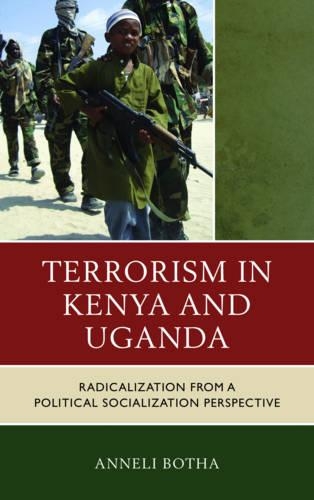
Terrorism in Kenya and Uganda: Radicalization from a Political Socialization Perspective
(Hardback)
Publishing Details
Terrorism in Kenya and Uganda: Radicalization from a Political Socialization Perspective
By (Author) Anneli Botha
Bloomsbury Publishing PLC
Lexington Books
2nd November 2016
United States
Classifications
Professional and Scholarly
Non Fiction
363.32509676
Physical Properties
Hardback
256
Width 158mm, Height 240mm, Spine 22mm
503g
Description
This book analyzes some of the commonly accepted causes of radicalization within the context of four organizations in eastern Africa. It identifies and discusses the facilitating agents needed to enable radicalization and recruitment, and answers one of the most fundamental questions the public and scholars alike are confronted with: Why are all people confronted with the same external circumstances not being radicalized Practitioners and policymakers will realize that although one can learn from the experiences of others, developing and implementing effective counter-radicalization strategies should be shaped around the unique circumstances of the specific organization.
Reviews
This is an outstanding study providing insights on radicalization in Kenya and Uganda from an individual perspective, whilst at the same time cognizant of the external conditions shaping the processes of radicalization. Incredibly detailed, empirically grounded on hundreds of interviews and anchored by voluminous secondary sources, this book is a must read for academics and policy-makers seeking to understand processes of radicalization as they attempt to end the scourge of terrorism. -- Hussein Solomon, University of the Free State
The jury of the Terrorism Research Initiative (TRI), an international consortium of institutes in the field of security studies, awarded Anneli Botha with the prize for the 'Best Ph.D. Thesis in the Field of Terrorism Studies of the Year 2014'. I am delighted to see that her path-breaking research is now becoming available to a wider public. It goes a long way to answer the anguished question of a mother that triggered Dr. Botha's study: why did one of my sons become a terrorist while the other became a policeman -- Alex P. Schmid, Terrorism Research Initiative, Vienna
Two pressing questions inform this study: To what extent can political socialization explain the participation of individuals in terrorist organizations in Kenya and Uganda; and is there a difference in the applicable factors between the divergent ideological frameworks of the Allied Democratic Forces and the Lords Resistance Army in Uganda, and al-Shabaab and the Mombasa Republican Council in Kenya Drawing on 285 interviews with members of these four organizations and the families of al-Shabaab members who had been killed or incarcerated, or who had disappeared in Kenya, Anneli Botha adds important and insightful perspectives to the existing knowledge base on the drivers underlying violent radicalization and terrorism in the eastern parts of the African continent. -- Theodor Neethling, University of the Free State
Author Bio
Anneli Botha is a research associate of political studies and governance at the University of the Free State.
